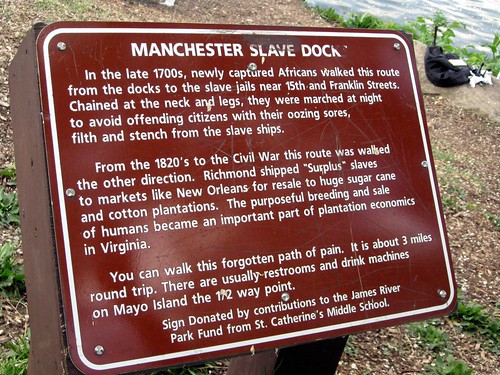
The Manchester Slave Dock on the banks of the James River in Richmond, Virginia. Africans were brought to this area beginning in the late 1700s. (Photo: Ana Edwards), a photo by Pan-African News Wire File Photos on Flickr.
Ballpark in Va. slave-trade center opposed
By STEVE SZKOTAK
Associated Press
Monday, Oct. 14, 2013
RICHMOND, Va.
Historians and community activists argued Monday that a section of Richmond that was home to the city's once-thriving slave-trading center is no place to build a minor league baseball park.
While a plan for a new stadium has not been formally proposed, opponents said the city's Shockoe Bottom section should be ruled out as "sacred ground" and instead be developed in memory of the 300,000 to 350,000 Africans who were traded there for two centuries until the Civil War. They said too many African American historic sites already have been paved over or ignored in Richmond and Virginia.
"We are not opposed to growth," said Christy S. Coleman, president of the American Civil War Center at Historic Tredegar. "In fact, we encourage it, but not if the cost is so high that it allows us to forget our past, even the most painful elements."
Shockoe Bottom, located east of the city's financial district, has been transformed over the years. It is now the home of nightclubs, restaurants and former tobacco warehouses that have been converted to lofts for young professionals. Only recently has the city attempted to recognize its shameful history as a slave-trading center second only to New Orleans.
Slave trail markers tell the region's history, from the James River where slaves were transported on steamboats to an archaeological dig at Lumpkin's Slave Jail, the largest slave-holding center from 1840 until the end of the Civil War.
Ballpark opponents recalled how Interstate 95 carved a path through Jackson Ward, a thriving center of black culture and wealth, and paved over slave cemeteries. They said they want to blunt a Shockoe Bottom stadium before it gains momentum.
Shawn O. Utsey, former chair of African-American studies at Virginia Commonwealth University, said the anti-ballpark effort is aimed at protecting the sanctity of "our holocaust." He said ignoring its history would be akin to tearing down Nazi Germany's concentration camps.
"If this was Dachau or Buchenwald, would we be here talking and having this discussion?" he asked.
The Richmond Times-Dispatch has reported that Mayor Dwight C. Jones is preparing to propose private development of a stadium in the Bottom. It would be part of a larger economic development.
A spokeswoman for Jones said Monday he "looks forward to a discussion about specifics when a proposal is presented."
The city's current stadium, The Diamond, is home to the minor league Richmond Flying Squirrels. It is located several miles northwest of Shockoe Bottom in an industrial warehouse area. That area is also being considered for a new park.
Ana Edwards, who chairs the Sacred Ground Historical Reclamation Project, said the city has said the stadium would not built on land where the commerce of slavery was conducted. But she disagreed.
"Selling human beings was the largest industry in Virginia at the time," she said. "This shoehorning would forever diminish the humanity of what happened here."
Edwards said instead of a ballpark, she envisions the creation of a 3-by-4-block area into a park system with exhibits, an information center and ultimately a museum.
Coleman said 40 different auction houses once populated Shockoe Bottom.
"Yet today few if any of these remain," she said. "While there are certainly those who would say, 'Good riddance, we don't need reminders of that painful past,' the reality is we do, because without them we lose a piece of ourselves in the process."
Steve Szkotak can be reached on Twitter at http://twitter.com/sszkotakap
Read more here: http://www.charlotteobserver.com/2013/10/14/4388312/ballpark-in-va-slave-trade-center.html#.Ul4W9FCTiHg#storylink=cpy
No comments:
Post a Comment